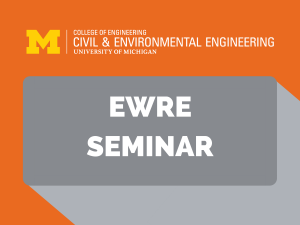Presented By: Civil and Environmental Engineering
Lateral circulation and its role in disrupting the classical pattern of intra-tidal stratification in estuaries
Lissa MacVean

The tidal cycle variability of stratification in an estuary is controlled by the interaction between tidal flows, bathymetry, and the estuary's longitudinal salt gradient. Two-dimensional analysis (in the vertical-longitudinal plane) of a straight, estuarine channel yields the classical theory of periodic stratification from tidal straining, and this mechanism typically works to enhance stratification on ebb tides and break it down through active mixing on flood tides. Ecological implications of mixing relative to tidal phase include whether sediment can reach perimeter habitats high in the tidal prism, whether phytoplankton reach sunlight, and whether hypoxia at depth persists longer than biology can tolerate. This pattern of stratification can be disrupted by density-driven exchange with shallow regions lining the channel: differential advection over channel-shoal bathymetry sets up lateral gradients in velocity, straining the salinity field and driving an input of fresher water at the surface of the channel during flood tides. Here, we present analytical scaling groups to weigh the contributions of longitudinal and lateral tidal straining and explore the conditions which lead to flood-tide stratification through this lateral exchange mechanism. Idealized, fully three-dimensional model results from the Regional Ocean Modeling System (ROMS) are used to explore the parameter space described by the scaling groups.
Lissa MacVean is a Lecturer in the Department of Civil and Environmental Engineering at the University of Michigan. Her research is focused on the physics of water in lakes, estuaries, and marine coastal environments.
Lissa MacVean is a Lecturer in the Department of Civil and Environmental Engineering at the University of Michigan. Her research is focused on the physics of water in lakes, estuaries, and marine coastal environments.